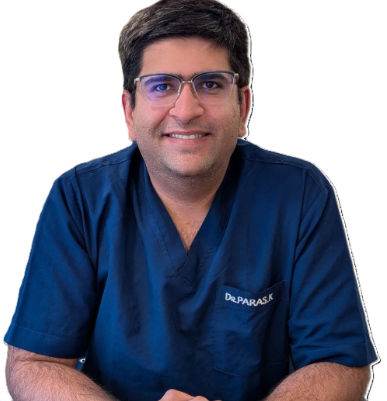Food not to Eat after Cataract Surgery - Diet to Take & Avoid

Quick Summary
- Avoid eating food that is high in sugar, fat, and salt.
- Eat plenty of fruits, vegetables, and whole grains.
- Drink plenty of fluids to stay hydrated.
Cataract surgery involves removing the lens of your eye and replacing it with a new lens. Food plays an important role in the post-recovery period. You should be aware of the food not to eat after cataract surgery, as these may slow the healing process.
Following a nutritious diet after cataract surgery play a vital role in regaining your health. Incorporating a healthy diet comprising greens, fruits, nuts, veggies, etc., is the key to successful recovery post-surgery. To know more about the diet and which food not to eat after cataract surgery, read on.
What is Cataract surgery?
Cataract surgery is a procedure in which the eye's lens is removed and replaced with an artificial lens. This surgery is usually done as an outpatient procedure, and you will be allowed to go home the same day. The surgeon will give the right advice on the post-operative care instructions at home. Regular and timely use of eye drops, oral antibiotics, care of the eyes and adequate nutrition are critical to a successful recovery post-surgery. Did you know that eating healthy and nutritious food post-cataract surgery helps in recovery?
As with all surgeries, cataract surgery comes with its own Dos and Don'ts. Read on to learn more about what to eat after cataract surgery and which foods to avoid if you have undergone cataract surgery recently.


What is The Role of Food After Cataract Surgery?
- Food plays a vital role in the health of your eyes. When your eye is healing after cataract surgery, you should consume a good diet for your overall health. It is essential to include fibre-rich foods, lean proteins and green veggies in your diet as these foods speed up your recovery.
- Foods high in refined carbohydrates and sugars (bread, pasta, chips, cereals) and junk foods are the food not to eat after cataract surgery as they can increase sugar and cholesterol levels which may cause damage to the blood vessels of your eyes.
- This risk increases in patients with pre-existing lifestyle diseases like diabetes, hypertension, etc.
Food Not To Eat After Cataract Surgery
After cataract surgery, there are some foods that you need to limit or avoid, especially if you have comorbidities like diabetes. Avoiding such foods will help in faster healing of the eye.
- Simple Carbs: Foods containing carbohydrates are digested quickly and cause a spike in blood sugar levels. This can be harmful while recovering from cataract surgery. These foods are high in calories, and low in nutrients and so may also make you prone to develop a cataract. Simple carbs are some of the foods to be avoided after cataract surgery white rice, sugar, white flour, honey, fruits with high sugar, etc.
- Processed Foods: These foodstuffs are unhealthy as they have many harmful ingredients like trans fats, saturated fats, sodium, sugar, and many other harmful ingredients. Eating a lot of processed food can result in causing various dangerous diseases. Processed foods are some of the foods not to be eaten after cataract surgery as they will delay the healing process. These food items include:
- Packaged food items like bread
- Junk food like pizzas, burgers, etc
- Biscuits and cookies
- Foods with High Sodium Content: Too much salt can lead to an increase in blood pressure. This, in turn, will have undesirable effects on the eyes. Therefore, salt is one of the foods not to be eaten after cataract surgery. The foods with a lot of salt added to them include:
- Junk food like french fries, chips
- Pickles
- Canned food like fish
- Fried Foods: Frying destroys all the nutrients and makes the food useless to your body. Eating such food after cataract surgery will only delay the healing of your eyes. These may be any of the following:
- Samosas
- Pakoras
- Parathas
- Excessive Ghee or clarified butter
- Spicy Foods: Foods with too much spice in them release a lot of free radicals into your body by increasing the oxidation process. These free radicals interfere with the healing process after cataract surgery and increase the risk of recurrent cataracts. Spicy foods form part of the foods not to be eaten after cataract surgery and may include:
- Chillies
- Peppers
- Foods containing a lot of masalas and spices.
- Stimulants: Stimulants play an essential role in the list of foods to be avoided after cataract surgery. Stimulants can interfere with medications that are prescribed after cataract surgery. They can also keep you awake and prevent your body from getting the rest it requires for recovery after surgery. Some of the stimulants are as follows:
- Tea
- Coffee
- Alcohol
- Beer
- Tobacco
- Cigarette
What to Eat After Cataract Surgery
After your cataract surgery, eating healthy and nutritious food is necessary for faster eye recovery. Also, a balanced diet, as your surgeon advises, helps prevent complications that can arise post-surgery.
- Vitamin A: Vitamin A, also known as Retinol, is the best food for the eyes. Including foods containing Retinol will help you to recover faster from cataract surgery. These are:
- Green leafy vegetables like spinach (palak)
- Papaya
- Carrots
- Vitamin C: Vitamin C is known for its role in the faster healing of wounds. Foods rich in Vitamin C can help the eye to heal. Examples include:
- Oranges
- Lemons
- Sweet lime
- Guava
- Kiwi
- Broccoli
- Tomatoes
- Protein-rich Foods: These foods help the wound to heal faster. Proteins also help boost your immune system, which will aid in faster recovery after cataract surgery.
- Meat: lean meat, skinless poultry, fish
- Eggs
- Soy and soy products: tofu, fortified soy milk, soybean, etc.
- Milk and dairy products like yoghurt
- Beans and lentils
- Nuts like almonds, walnuts, and chia seeds
- Green Leafy Vegetables: These veggies are rich in iron. Including green leafy vegetables in the diet after cataract surgery ensures healing and quicker vision restoration.
- Spinach
- Kale
- Fenugreek (Methi)
- Lettuce
- Spices: They have anti-inflammatory properties that can help boost the immune system and promote healing. Examples of such food items include:
- Turmeric
- Cinnamon
- Coriander
- Ginger
Other Beneficial Tips After Cataract Surgery
Apart from the diet after cataract surgery to be followed, there are some essential things you should keep in mind while recovering at home.
- Avoid driving: Your surgeon will instruct you not to drive for 3 to 4 days post-surgery. You can start driving once you get clearance from your doctor after the follow-up consultation.
- Protect your eyes: Your doctor will advise you to wear an eye shield for 4 to 5 post-surgery. This would protect you from the dirt, pollution and rubbing your eyes. You should wear this shield while travelling but can remove it for a few hours at home. The eye shield must be worn during the night while sleeping.
- Avoid bright lighting: For the first 24 hours post-surgery, you should avoid harsh lighting. This includes light from your phone, mobile, television, etc. If there are fluorescent lights at home, change them to warm, dim lights. This will soothe and relax your eyes and help in faster recovery.
- Do not use water on the face: Avoid splashing water on your face for 1-week post-surgery, as it will bring on infections and complications. You can use a wet cloth to wipe your face. You may be allowed to have a bath as per the advice and instructions are given by your doctor.
- Take medications on time: Regular intake of medicines as prescribed by your doctor will ensure a quicker recovery.
- Wear sunglasses while going out in the sun: Your doctor will advise you to wear dark UV glasses while going out in the sun. This will help to protect your eyes from bright light.
- Keep your home dust free: This will reduce the chances of eye infections.
- Stay hydrated: You should keep yourself hydrated by drinking 2 to 3 litres daily.
- Avoid strenuous exercises: Lifting heavy weights or high-intensity exercises can lead to an increase in eye pressure. This may cause the incision over the eye to open up. It is advisable to consult your doctor on the type of exercises that you can do post-surgery.
Conclusion
Cataract surgery is a painless procedure done on an outpatient basis. Even though there are not many dietary restrictions here, you should be aware of the foods you should not eat after cataract surgery. Also, remember the diet you should take after cataract surgery to recover quickly.
Consult our doctors and dieticians at HexaHealth if you have any further doubts about food to avoid after laser eye surgery. You can also call us on our toll-free number and talk to us to get the proper guidance.
Frequently Asked Questions
What food should I avoid after eye surgery?
Avoid unhealthy foods like junk food, foods with high salt in them, processed foods and fried foods. Also, steer clear of stimulants like coffee, tea, tobacco and alcohol, as these foods will delay your recovery.
What is the diet for cataract patients?
The diet for cataract patients should ideally consist of foods rich in Vitamin A, C, and antioxidants. You should include green leafy vegetables, fresh citrus fruits, nuts, and essential spices in the diet.
What food is good for eye healing?
Vitamin A, Vitamin C and antioxidants are the primary nutrients for the eyes. Foods like carrots, spinach, papaya, kale, and fresh fruits like kiwis, strawberries and oranges are good for eye healing.
How many days do we have to take rest after cataract surgery?
Cataract surgery recovery time varies from individual to individual. You can resume your regular activities a couple of days after the surgery. Daily activities like driving, exposure to bright light, watching TV, reading, etc., can be performed after about seven days from the day of surgery. You must follow your doctor’s instructions properly post-surgery.
Which is the best fruit for the eyes?
Orange, strawberries, kiwis, bananas, lemon, and grapefruit are some fruits that are the best for the eyes. These fruits are rich in vitamins A and C and antioxidants that promote faster eye healing.
Do eggs help eye health?
Eggs are good for eye health. The egg yolk contains vitamin A, zinc, lutein, and zeaxanthin, which are vital for the eyes. Eating eggs regularly will also benefit your eyes in the long run.
Can we drink milk after cataract surgery?
There is no proven link between the consumption of dairy products and milk with the development of cataracts. There may be a widespread belief that consuming milk may lead to the development of cataracts in old age, but studies have found no definitive link between both.7
Is rice good for the eyes?
Whole Grains like brown rice contain niacin, zinc and vitamin E, which are suitable for the eyes. It is advisable to swap white rice with brown rice. Brown rice and wholegrains will ensure that your eyes get all the required nourishment.
Can you eat and drink after cataract surgery?
Yes, you can start with a light meal right after the surgery. You must eat healthy, fresh, home-cooked foods that are good for your eyes. Do not eat food that is very oily and has a lot of salt or sugar in it.
How to wash your face after Cataract Surgery?
It is advisable not to splash water on your face for at least a week after cataract surgery. Your eye is an open wound after surgery and is prone to infections. Washing your face with water or soap will cause it to get infected and increase the chances of developing complications. It is advisable to use a wet cloth/wet tissue to wipe your face till the wound heals.
How to sleep after Cataract Surgery?
It is essential to get enough sleep after cataract surgery. This helps in the healing of the wound. You can sleep on your back or the opposite side of the operated eye. Sleeping away from the operated side of the eye prevents pressure build-up of the eye and the risk of irritation and infection. You should always wear an eye shield provided by your doctor while sleeping at night, as it will protect you from eye damage if you turn over.
Last Updated on: 2 January 2023
Reviewer

Dr. Aman Priya Khanna
MBBS, DNB General Surgery, FMAS, FIAGES, FALS Bariatric, MNAMS General Surgery
13 Years Experience
Dr Aman Priya Khanna is a highly experienced and National Board–Certified Laparoscopic, GI, and Bariatric Surgeon with over 13 years of clinical expertise.
He is widely regarded as one of the best bariatric surgeons in Ahmedabad, ...View More
Author

She is an accomplished new-age professional who has interviewed prominent personalities such as Bhaichung Bhutia, G. Sathiyan, Shashi Tharoor, etc. A content writer interested in health communication, graphic desi...View More
Expert Doctors (10)
NABH Accredited Hospitals (5)
Latest Health Articles
Related Treatments




























 Open In App
Open In App